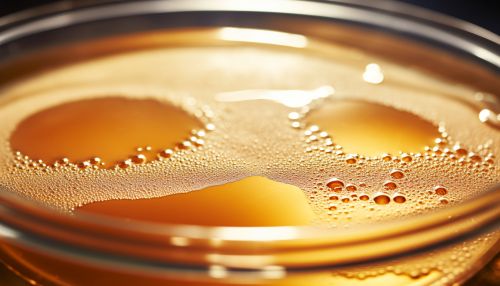Fermentation (biochemistry)
Introduction
Fermentation in biochemistry refers to the metabolic process that converts sugar to acids, gases, or alcohol. It occurs in yeast and bacteria, but also in oxygen-starved muscle cells, as in the case of lactic acid fermentation. The science of fermentation is known as zymology.
History
The process of fermentation was first observed by the French microbiologist Pasteur, who termed it "respiration without air". Pasteur performed careful research and concluded that fermentation was caused by microscopic organisms later called yeasts.
Biochemical Overview
Fermentation does not require oxygen. Instead, it uses a substrate, such as glucose. In the absence of oxygen, cells convert glucose to lactic acid or ethanol to produce ATP, which can be used for cellular processes. This is in contrast to aerobic respiration, where oxygen is consumed as a reactant along with the organic fuel.
Types of Fermentation
There are two primary types of fermentation: lactic acid fermentation and alcoholic fermentation. Both types are used in the production of various food products.
Lactic Acid Fermentation
Lactic acid fermentation is a metabolic process by which glucose or other six-carbon sugars are converted into cellular energy and the metabolite lactate. It is an anaerobic fermentation reaction that occurs in some bacteria and animal cells, such as muscle cells.
Alcoholic Fermentation
Alcoholic fermentation, also referred to as ethanol fermentation, is a biological process which converts sugars such as glucose, fructose, and sucrose into cellular energy, producing ethanol and carbon dioxide as by-products.
Fermentation in Food Production
Fermentation is used in the production of various food products, including bread, yogurt, and alcoholic beverages. The process of fermentation enhances the nutrient content of food and contributes to taste, aroma, and texture.
Bread Production
In the production of bread, fermentation is essential. Yeast, a key ingredient in bread making, ferments the carbohydrates in the dough, producing carbon dioxide gas. This gas forms bubbles in the dough, causing it to rise.
Yogurt Production
In yogurt production, specific strains of bacteria are used to ferment lactose, the primary sugar in milk. This fermentation process produces lactic acid, which acts on milk protein to give yogurt its texture and tangy flavor.
Alcoholic Beverages
Fermentation is the process that produces alcoholic beverages. In the production of beer, wine, and spirits, yeast ferments the sugars in the starting material to produce alcohol.
Role in Energy Production
Fermentation is a crucial part of energy production in organisms. Under anaerobic conditions, cells must rely on fermentation to produce ATP and regenerate NAD+ from NADH.
Industrial Applications
Fermentation has a wide range of industrial applications beyond food production. It is used in the pharmaceutical industry for the production of drugs and vaccines. In the chemical industry, fermentation is used for the production of chemicals such as acetic acid and ethanol.
Environmental Impact
Fermentation processes, particularly those used in industrial applications, can have significant environmental impacts. These can include the production of greenhouse gases, such as carbon dioxide and methane, and the potential for water pollution from waste products.
See Also


References
1. Pasteur, L. (1858). "The lactic fermentation". Annales de Chimie et de Physique. 52: 404–418. 2. Nelson, D.L.; Cox, M.M. (2005). Lehninger Principles of Biochemistry. New York: W.H. Freeman and Company. pp. 153–154. 3. Madigan, M.T.; Martinko, J.M. (editors) (2005). Brock Biology of Microorganisms (11th ed.). Prentice Hall. ISBN 0-13-144329-1.
